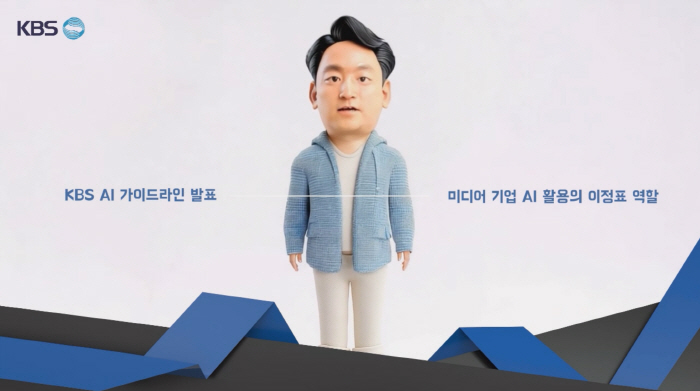KBS establishes AI Guidelines...Use the result without verification on the news X
Aug 18, 2025
|
With the revitalization of AI broadcasting, foreign broadcasters such as the BBC in the United Kingdom, CNN in the United States, and NHK in Japan have already prepared and implemented their own AI guidelines. KBS has created and implemented KBS broadcasting production guidelines for the first time by a domestic broadcaster in 1998, and has established and implemented a separate AI guideline, which is the standard for AI production.
Since President Park Jang-beom declared this year as the `first year of AI broadcasting' at the construction establishment ceremony in March, KBS has been pushing for an all-round AI transition, including promoting comprehensive business alliances with Naver. Accordingly, KBS formed an in-house T/F (Chairman Kim Do-yup, Director of Media Research Institute) under the judgment that it is urgently necessary to prepare and distribute standards and principles for AI use, and prepared the final draft after consulting with the Korean Press Association seminar, collecting opinions from eight professional organizations, and consulting with the KBS AI Broadcasting Innovation Advisory Committee.
The KBS AI Guidelines, which consists of the preface and a total of 8 Article 25, are preparing norms and controls to prevent ethical and legal risks from expanding AI, as KBS, which has been leading the way in responding to technological changes, promised to fulfill its responsibilities as a public broadcaster by actively utilizing AI.
In order to protect the rights and interests of others faithfully, there are rights and interests protection regulations for each type, and post-verification, including the principle of preserving utilization records, in addition to notifying the use of AI?The point that facilitated the evaluation is evaluated as an advanced regulation that is not even found in the BBC or CNN.
▶ Declaration of human-centered AI principles
KBS's AI guidelines, in the preface and Article 1, acknowledge that AI is a useful means to greatly increase production efficiency, and announce its plan to actively utilize it, but stipulate that AI utilization should be used as a means to assist humans, and that it must undergo multi-layered human supervision and final approval.
Subsequently, Articles 2-8, which correspond to the main body, contain various normative contents that must be observed in the process of using AI. Articles 2 to 4 stipulate that the use of artificial intelligence should meet the values of KBS, a public broadcaster, and that efforts should be made to confirm and verify facts, keeping in mind that legal and ethical responsibilities are involved in this process. In addition, it also stipulates procedural standards that contents and public services using artificial intelligence should be officially used after final confirmation by the person in charge.
▶ Principles of using AI in journalism such as news
The KBS AI guidelines presented stricter AI utilization standards in journalism areas such as news and current affairs content compared to other production contents such as entertainment and dramas. Specifically, the principle of "news and current affairs content is not to use artificial intelligence results without verification in coverage and article writing." This prohibits the use of Generative AI in news articles or factual research.' is similar to the BBC AI guidelines, which strictly applies the use of AI in consideration of the nature of journalism where reliability is life-threatening, but allows the use of artificial intelligence as an auxiliary tool to the extent that it does not distort facts and mislead users. In addition, it stipulated that the use of AI in the production of news and current affairs content should take special consideration of fairness and accuracy, suggesting strict standards as public media.
▶ Mandatory to indicate sources and preserve utilization records
KBS AI guidelines stipulate that if AI is used in broadcast production, viewers should be notified so that they can clearly recognize this fact, and even the source should be indicated if necessary. In addition, regarding the display method, if there is a relevant statute, it is required to follow it.
In addition, it stipulates that `in principle, service or content producers using artificial intelligence should preserve their utilization records.' It goes one step further from the source indication and stipulates the principle of preserving utilization records, which is difficult to find in other AI guidelines, and is evaluated as a part of KBS's willingness to use AI transparently and fairly.
▶ Copyright and Personal Rights Protection Regulations are also in place
KBS paid attention to the infringement of the rights and interests of others due to the popularization of AI through the advice of many experts in the process of enacting the AI guidelines. Accordingly, protection of rights and interests (Article 6), portrait?By separating voice rights (Article 7) and copyright protection (Article 8), the specificity of each type of right was enhanced.
Specifically, it is mandatory to take measures to prevent the leakage of personal information and unauthorized use of AI learning data, and it stipulates that AI content that violates the rights and interests of others should be quickly deleted or corrected. If the BBC and CNN only mentioned compliance and ethical rules in parallel, would KBS be legal?Ethical responsibility was emphasized in a separate article (Article 3), and procedures such as analysis of the cause of correction and deletion were specified when an error was found.
In addition, it contains the obligation to respect other people's personal rights, such as portrait rights and voice rights, which is considered to show a willingness to actively cope with the infringement of personal rights that can be issued in the process of activating AI as well as complying with related laws. It also stipulates that appropriate protective measures should be taken to prevent the contents of the public broadcaster KBS, which is a public asset, from being used by others without permission.
The AI guidelines established this time will be distributed to all employees and used for production and practice in general, and will be used as guidelines for program production and service along with existing KBS broadcast production guidelines.
In addition, the corporation plans to continuously update the guidelines with the advice of KBS AI broadcasting innovation advisors in line with the pace of activation of artificial intelligence broadcasting. Specific methodologies such as securing diversity of learning data, algorithm audit, and regular bias evaluation to prevent AI bias problems while actively using AI will also be included in future guidelines. After the implementation of the AI guidelines, it will also create operational guidelines that can be applied to producers in practice, which will include a checklist for bias review, standard phrases for transparency notices, and methods of visual and auditory marking.
Kim Do-yup, director of KBS Media Research Institute, said "In making this guideline, we made efforts to achieve a balance of two values: the use of AI technology and compliance with publicity."We plan to prepare detailed AI standards that can be specifically applied in the production process in the future, and we will also conduct related research to take the lead in responding to rights violations caused by AI.
star77@sportschosun.com














